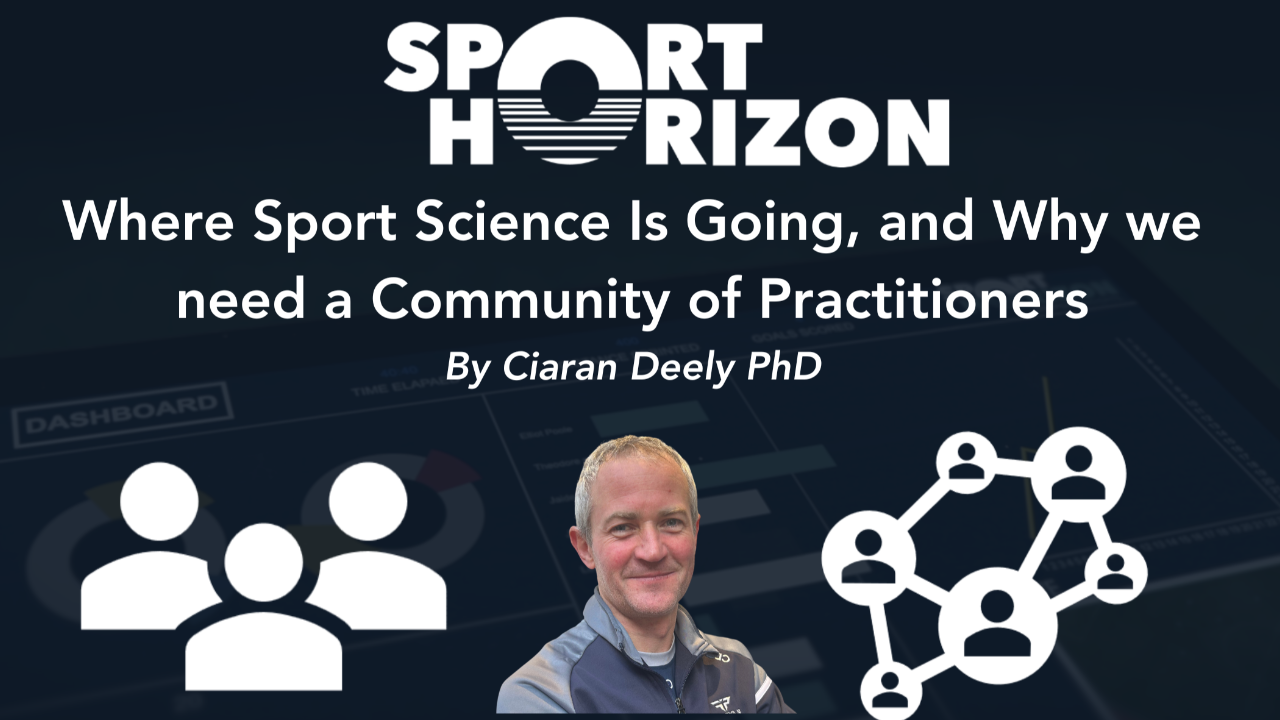Where Sport Science Is Going, and Why we need a Community of Practitioners
Jul 23, 2025
By Ciaran Deely PhD
If you work in sport—coaching, sport science, analysis, S&C—you’ve likely felt it: There’s more information than ever. But less clarity.
GPS files, testing scores, match data, subjective reports, gym attendance... You collect it all, you clean it (when there’s time), and then—somewhere between planning sessions and managing bodies—you try to turn it into something useful.
It’s one of the most common challenges in sport today: We’re not short on data. We’re short on time, context, and confidence in how we apply it.
The Shift We’re Living Through
Across the industry, we’re seeing a shift in how sport science is viewed—and what’s expected of practitioners. It’s no longer enough to simply use tech, track load, or build a dashboard. What matters now is how we apply those tools, and why we use them in the first place.
This is what people like Martin Buchheit have called Sport Science 3.0: A move away from just collecting data, and toward critical, scientific, applied thinking. A sport science that is contextual, reflective, and embedded in team environments. Where the best practitioners aren’t just technicians—they’re problem-solvers and communicators.
We’ve moved beyond the phase of blindly trusting numbers. Now, we’re asking:
· What questions are we trying to answer?
· What data truly supports decision-making?
· How do we communicate that data in a way that actually lands?
That’s what this next phase of the field looks like. And most of us are trying to find our way through it—while still doing all the other things the job demands.
A Personal Reflection
In my own career, I’ve felt both the excitement and the chaos of this evolution.
I’ve worked as a sport scientist here in the UK for Queens Park Rangers FC and in the Indian Super League with Kerala Blasters FC, where performance demands were high, resources tight, and every training decision mattered. I’ve also been manager and head coach of the London Senior Gaelic Football team, trying to build systems in an amateur setup that mirrored some of the professionalism I’d experienced abroad. And before all that, I played for Wexford at national level in Ireland, which was my first experience of high performance sport and gave me some unique insights from the other side of the white line.
Now, I find myself back in boots—captaining the London Masters Over-40s Gaelic football team. It’s a different type of performance now. We’re training to stay fit, to enjoy it, to go on a
journey together as a team of lads. And of course—to try to win a few matches and maybe a cup or two along the way.
But even at that level, I see the same truth: Sport works best when we combine people, process, and insight. Not just data for the sake of data. Not overcomplicated reports. Just clarity, context, and shared understanding.
A Need for Community, Not Just Tools
This is why a growing number of practitioners are turning toward each other—sharing dashboards, asking questions, and exchanging ideas that work in real environments.
We’re not just trying to “upskill.” We’re trying to:
· Ask better questions
· Build tools that save time and help people
· Communicate more clearly with coaches and players
· Make sense of the mess, together
That’s the spirit behind the community we’re building—not a product or platform, but a space where practitioners at all levels can reflect, learn, and improve. Without pressure. Without perfection.
Because no matter what level you’re working at—professional or amateur, elite or grassroots—you’re probably facing similar challenges. And the truth is, we figure them out faster when we’re not doing it alone.
Where We’re Headed
The next era of sport science won’t be led by the flashiest dashboards or the most complex models. It’ll be shaped by practitioners who know their context, understand their athletes, and apply the right solutions at the right time.
It’s not about doing more. It’s about doing things better. With care, with clarity, and with each other.
So whether you're managing a national team, supporting an academy, coaching part-time, or still lacing up the boots for training midweek—you’re part of this shift.
Let’s keep asking questions; keep learning from each other; keep raising the standard of what it means to work in sport.
Not just for the data and the science, but for the people and the community it’s meant to support.
Stay connected with news and updates!
Join our mailing list to receive the latest news and updates from our team.
We hate SPAM. We will never sell your information, for any reason.

